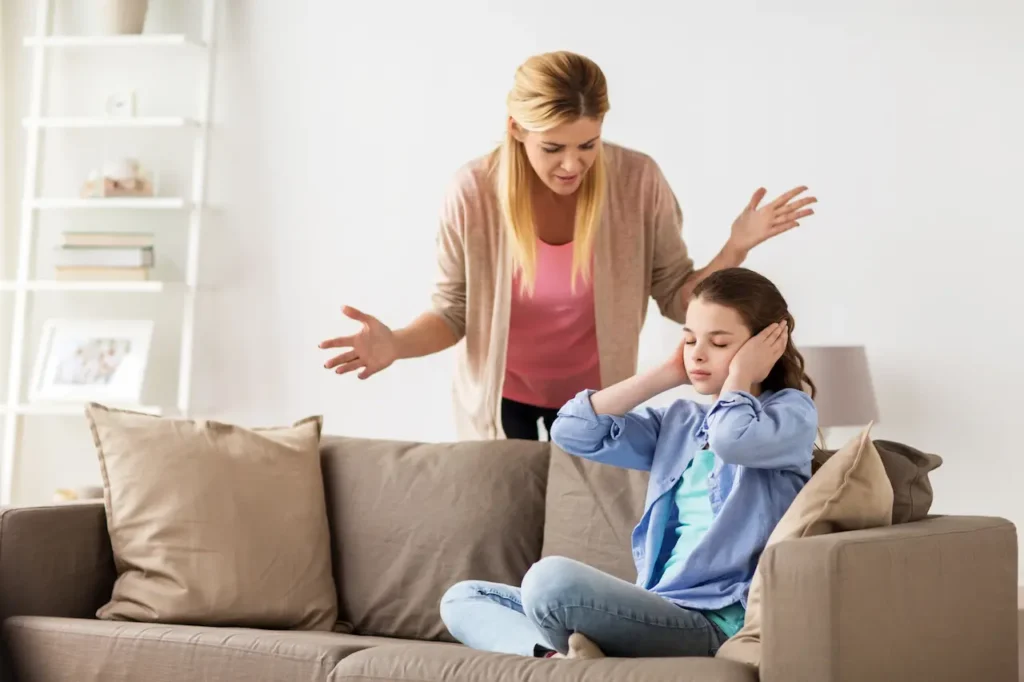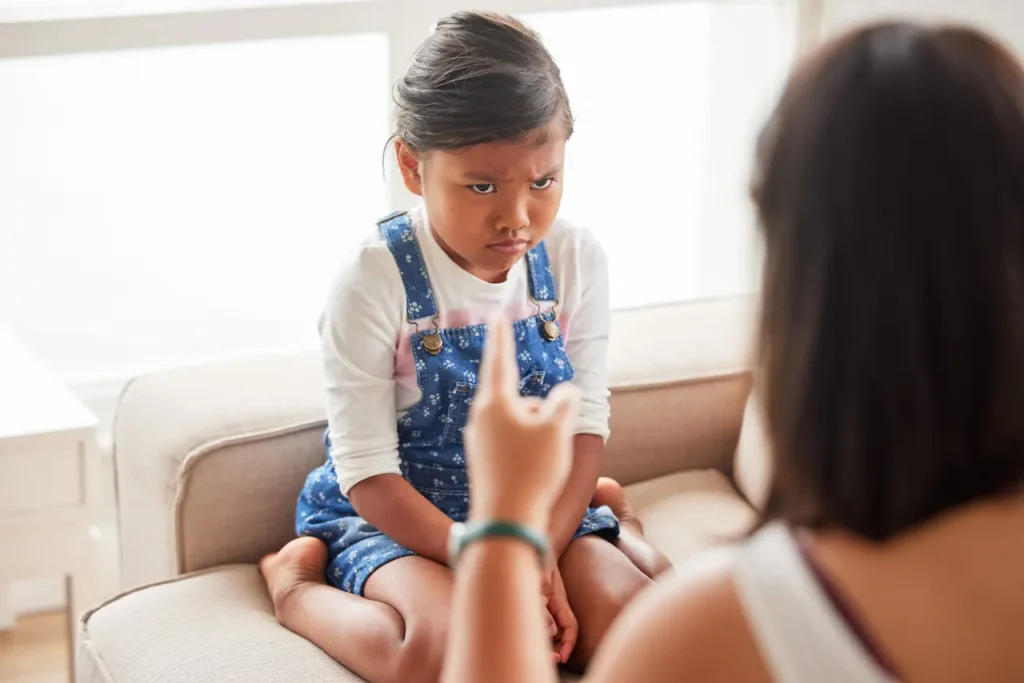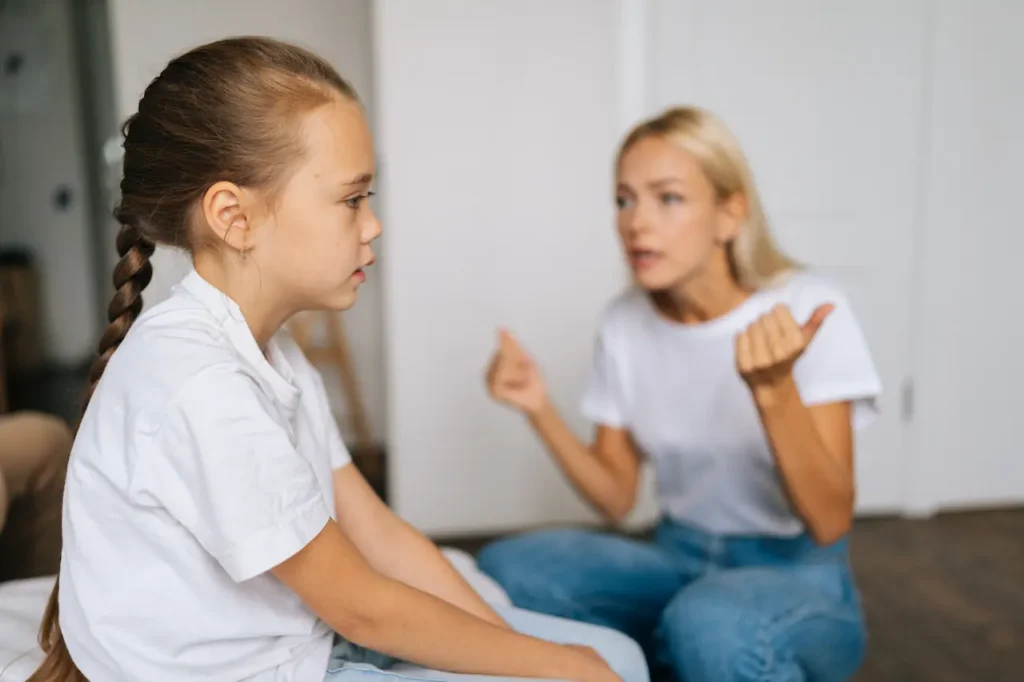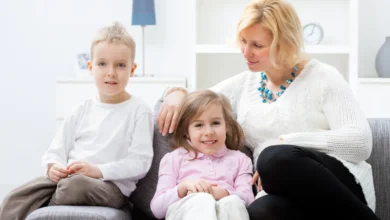Five Ways to Stop Yelling At Your Children
How to Use Positive Discipline Instead of Yelling
Mastering Your Emotions
Sharon Turton is a psychotherapist and counselor who has written The Art of Peaceful Parenting. She understands how difficult it can be to remain calm when parenting chaos takes over. She acknowledges the importance and difficulty of implementing peaceful parenting strategies. The good news is? You can develop a more composed and patient parenting style with practice and persistence.
This blog will explore Sharon’s top parenting tips for a peaceful approach to parenting.

1. Pause, Breathe and Reconnect
The best way to deal with emotional heat is to take a moment to breathe.
“When we find ourselves in stressful situations–overwhelmed, exhausted, or frustrated–it’s vital to take a moment to pause,” Sharon explains. This small pause can create space between you and the trigger event, even if only for a few moments.
In these moments, a few deep breaths with intention can do wonders. Deep belly breathing activates the parasympathetic system, which promotes relaxation. This activates your brain to say, “This is not an emergency. I can handle it.”
Sharon recommends incorporating moments of breathing and pauses throughout your day. She advises, “Training your body to recognize that this is a useful tool will help it respond when you are in a stressful environment.”
Consider focusing on your breathing for a few moments each morning or in quiet times during the day. This will help you integrate the practice into your routine. This can be a great strategy to use when tensions are high.
2. Recognize How You Feel
Even when you feel uncomfortable, it is important to acknowledge and recognize your feelings. Although it’s easier to ignore feelings or repress them, this can have negative consequences on both you and your child.
Sharon explains that when strong emotions are felt, their energy remains in us. If we suppress it, eventually it will resurface – sometimes in unexpected ways.
It could happen tomorrow, next week, or years later. The suppression of emotions can lead to negative interactions in the family, as well as blame and shame. Sharon explains that we can become resentful and angry when we don’t confront our feelings. Face these feelings, which are often hidden beneath anger or stress.
Take a moment and acknowledge your feelings. You might be feeling frustrated, sad, or exhausted. Validating your emotions will help you to work through them rather than let them fester.
You May Also Like: Managing Your Active Child
3. Do Not Be Hard on Yourself
Self-compassion, while important in acknowledging your emotions, is also vital. As parents, we often hold ourselves to impossible expectations, which leads to guilt and self-criticism.
Sharon says that we tend to berate ourselves for not being “perfect” or not meeting our expectations. “Taking time to breathe and acknowledge our emotions can have a transformative effect.”
Remember to love yourself with the same passion you show your children. Self-soothing can help you cope with your loneliness and pain. You can connect better with your kids when you are kind to yourself.
Consider adding daily affirmations and self-compassion exercises to your routine. Reflect on the good things that happened each day and be grateful for them. Recognizing your parenting efforts, no matter how small, can foster a positive attitude and help build resilience.
4. Be Present in the Moment
It can be difficult to stay present, especially if you are dealing with a toddler who is prone to tantrums. In these moments, it is easy to lose focus and drift off to the next thing on your list.
When our child triggers us and we feel frustration building, we lose ourselves in thoughts such as, “Hurry up! Get your shoes on!” or “I told you to tidy your room.” Sharon explains.
You can respond to your child more genuinely and authentically by grounding yourself. Practice mindfulness to help you communicate better and manage stressful situations. Consider dedicating time every day to mindfulness exercises such as gentle yoga or meditation. These practices will help you develop a present-minded mindset that will make it easier for you to connect with your child in difficult moments.
When you are feeling overwhelmed, focusing on your senses can be a helpful technique. You can take a few moments to focus on your senses. Take note of what you see, hear and taste. This exercise will help you to be more present with your child and to respond to their needs.
5. Empathize with Your Child and See Things Through Their Eyes
Empathy is key to peaceful parenting. You can improve your parenting skills by seeing things from the child’s point of view.
If your child is building a Lego Tower and you announce that it’s time for them to leave, then they might feel as if they are being pulled away from something precious. Sharon says, “Of course there will be tears.” We can make the transition easier if we acknowledge their feelings.
Say something like “Wow! That’s a fantastic tower!” We can finish it when we get home.
You shouldn’t ignore or excuse unacceptable behavior. Empathy is the best way to approach these situations. If your child throws a tantrum when they want to play, empathize before you set a limit. I know you are enjoying your playtime, and it is hard to stop. We must leave, but when we return, we will play more.

You May Also Like: How To Manage Your Child’s Anxiety?
A Plan for Peaceful Parenting
After exploring some key strategies for peaceful parenthood, let’s talk about actionable steps that will help you stop screaming at your children and create a more harmonious household.
1. Prioritize Emotional and Physical Safety
As a parent, your primary responsibility is to make sure that your child feels safe emotionally and physically. This is why managing your emotions plays a vital role. Your calm presence will help your child feel safe, reduce their defensiveness, and encourage them to do better.
It’s up to you to take care of yourself if you feel overwhelmed. You should set aside some time every week to do things that will recharge you. This could be a hobby, an exercise session, or just relaxing. You and your children deserve to be calm and composed.
2. Commit to Your Family
Although it may seem daunting, committing openly to stop yelling will create accountability. Share your goals. Tell them you are working on it and you might stumble along the way. This will create a positive environment in which everyone works together to improve communication.
Encourage family members to also share their experiences and feelings. Encourage an open dialogue in which everyone can share their feelings and concerns. This will foster a culture of understanding among the family.
3. Take Responsibility for Your Well-being
It’s normal to feel frustrated, but it doesn’t mean we should take our frustrations out on other people. You can monitor your moods to know when you should take a step back and center yourself. Instead of lashing out, determine what you need to make yourself feel better and give it priority.
Consider creating a toolkit of self-care that you can use during difficult times. You might choose to do activities like journaling, walking, practicing mindfulness or talking with a friend. You can better manage your emotions if you know you have healthy coping mechanisms.
4. Children Will Always be Children
Your children are still developing and learning to understand their emotions. As part of their growth, they are naturally curious and test boundaries. You should respond to their immature behavior with patience and compassion.
You should expect some childish behavior, even if you try to be a calm and tolerant parent. You should be a role model for self-regulation even if they don’t yet show it.
5. Empathy is the Best Way to Deal With All Emotions
When your child expresses any emotion–frustration, sadness, joy–acknowledge it. This helps them to feel accepted and understood, which reduces the chances of conflicts and outbursts.
Validating your child’s feelings encourages them to explore their emotions. This is the first step to learning how to manage their emotions. They will learn to control their behavior as they get better at managing their emotions.
Create a space where your child can express his or her emotions. You could have regular family check-ins to share how everyone is feeling or encourage open discussion about emotions in daily routines.
6. Keep Connected While Setting Limits
When you need a connection, it is essential.
Set boundaries with your children. They will cooperate more when they feel that you are on their side.
Take a few moments to talk with your child before imposing a limit. They will be more open to your advice if they feel that you understand them. You can teach important lessons without yelling.
7. Use the STOP, DROP and BREATHE Technique
If you feel your anger starting to rise, use the STOP, DROP and BREATHE technique.
- STOP: Stop any actions or words that are currently being performed.
- DROP: Put aside your agenda momentarily.
- BREATHE Take deep breaths to calm down your nervous system.
This technique allows you to take control of your emotions before you react.
8. Take a Parent’s Time-out
If you feel overwhelmed, remove yourself physically from the situation. Breathe deeply and take a few minutes to center yourself. If you cannot leave the room, splash some water on your face and engage in an exercise that will help to divert your attention away from your child.
You can regain your composure by allowing yourself to deal with your emotions. You can then approach the situation more calmly.
9. Tap Into Your Inner Wisdom
When you’re feeling frustrated, access your inner wisdom. This is the part of yourself that wants what’s best. What would this inner voice say at that moment? Would it inspire you to respond with compassion and understanding? It would remind you that your children are still learning.
Self-reflection helps you shift your perspective and respond with more compassion.
10. Positive Actions are the Focus
It’s important to take a step back when emotions are high and not try to teach a message. Prioritize positive actions that encourage connection and healing. You might want to use a softer tone when you ask for something, apologize if there were any raised voices, or find a way of lightening the mood.
Consider, for example, that if tensions were high at dinner, you could play a game with your family or read together to restore harmony and a positive environment. A small step can make a big difference in creating a loving atmosphere.

Conclusion
It can be daunting to embark on the path of peaceful parenting, but it is also extremely rewarding. You can create a harmonious atmosphere for you and your kids by incorporating these strategies in your daily life.
Transformation takes time. It’s natural to fall back into old patterns. With practice, patience, and empathy, however, you can rewire the responses to your children and create a stronger bond.
What’s the good news? You will see positive changes in yourself and your child as you strive to be more peaceful. You can help your child navigate their emotions and relationships by modeling emotional regulation and compassionate behavior.
Don’t be afraid to rely on your support network when you need it. Together with your children, you can create a home that is filled with love, respect, and understanding. You can do it!



